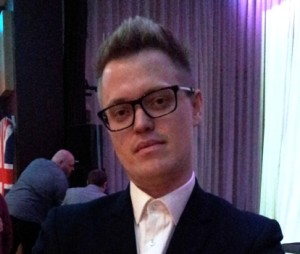
From Krakozia joining the contest to Svante Stockselius to the controversial incident that led to his departure from Eurovision. EuroVisionary caught up with Jarmo Siim, former Communications Co-ordinator for the Eurovision Song Contest, at Eurobash 2015 last Saturday.
Jarmo Siim has been involved in Eurovision for a long time. Starting as a journalist for a fan website, Estonian born Jarmo went on to be formally employed in Eurovision acting as the contest’s Communication Co-ordinator as well as chief editor of its official website eurovision.tv. He found himself at the centre of controversy last May in Vienna when there were allegations that, during a private conversation with a journalist acquaintance on his Facebook account, Siim had encouraged pressure being put on the Swedish delegation in regards to answering to plagiarism rumours. Jarmo subsequently decided to bring his formal involvement with Eurovision to a close.
We caught up with Jarmo at Birmingham’s Holiday Inn, the venue for OGAE UK’s Eurobash 2015, just before he was about to join the rest of the event’s VIP guests for a Q&A session with UK fans. While the Eurobash 2015 EuroQuiz was enthusiastically taking place in the main event hall next door, we sat with Jarmo – impeccably dressed in a smart suit and his trademark spectacles – for an interview.
EuroVisionary: First things first. What did you think of the Krakozian entry this year? (the non-existent ‘Krakozian’ entry has been a long standing joke among a few Eurovision employees)
Jarmo Siim: ‘Have you seen a video a few years ago we did about the Krakozian entry?’ (A few years ago, Jarmo and a friend had released a prank video asking people’s opinion of the ‘Krakozian entry’). ‘Well… everyone we asked how the entry was really liked it. So maybe they will be the guest next year, you know, after the Australian entry’ (laughs).
Eurovision is still the best contest in the world (…) Svante Stockselius had a huge role in that!
You have been involved in Eurovision for a very long time. You started from a fan website and then you went on to become communications co-ordinator for the EBU. How do you think that Eurovision has evolved during this time?
‘Naturally, it has become a lot bigger. And not only country-wise, which you can see easily, but I think the whole community has grown a lot. Of course, the social media have had a huge impact on that. Nowadays, on the official channels, we had already three million people following us as well as billion views on Youtube. You realize how big it is and I think that that is what changed (…) Ten-fifteen years ago, even when it (i.e. the contest) was in Estonia, it was tiny, it was the size of the Junior contest. But now it’s so much bigger and it’s still really at the top, it’s still the best contest in the world. I think it’s that the foundation became stronger over the years. There was some doubt (about the contest before): “Oh, it’s going down!” (…) But then it changed. I think that Svante Stockselius had a huge role in that. He was really really great!’
I had been thinking about leaving (…) you finish a contest and then you ask yourself: ‘can I do this once more and better than I did before?’
You mentioned the social media. You very suddenly stepped down a few months ago from your post and the incident was social media related to my understanding. Do you have any regrets about the whole situation and the way you decided to leave your post?
‘Well, first of all, I didn’t leave because of that. I had been thinking about leaving anyway because my contract was going to be over. There was a renegotiation period and I thought how better I can motivate myself to do this again. That is always the hardest bit (laughs) – if you finish a contest and then you ask yourself: ‘can I do this once more and better than I did the year before? (…) It takes so much out of you emotionally. You work eighteen hours a day for weeks. And, before that, you work sixteen hours a day for months (…) And that’s why I usually take June, July to think.
It was like: ‘ you know, this is my personal life. I have nothing to hide but you cannot invade my privacy like this.’
So leaving was something you had been considering for some time.
‘Yeah, for quite a long time. I wanted to see whether I can find the motivation again. And, in a way, the final straw for me, which was just that – it wasn’t anything decisive – was that, due to that strange social media story, I was asked to give free access to my personal profiles to third parties in the end so that they can check whatever (they like) and that to me was (crossing) the line. It was like: “you know, this is my personal life. I have nothing to hide but you cannot invade my privacy like this.” And then I thought: “do I want to work with these people who asked me this. Do I want to continue that?” And then I was like: “no, you know what? This is it!” And, if it’s something that ridiculous that leads to that, then I think that (the decision to leave) was right. Everyone who’s ever worked with me, every delegation knows how I worked for them. I tried to find a solution, I helped them in every way. I think this whole case was very much out of context. Naturally, I thought about this quite a lot later on – I didn’t have much time in Vienna ‘cause you’re so much in your zone – and I think it could have only been in the context of me wanting to get this topic finally out in the open. There were a lot of stories: “oh, this is plagiarism, this is blah blah blah” but no one asked us and I wanted to be able to answer it directly and say: “we have checked this. It is by the rules. This topic has ended.” But that’s just my theory of how it was because I don’t remember any conversations, I chat a lot… I actually found out thanks to the video afterwards who it probably was (Swedish tabloid Aftonbladet released an online video presenting what they believed to be evidence supporting the claims against Jarmo but the video’s validity is contested by Jarmo and others) (…) which is weird for me because we’ve known each other for more than ten years.’
I don’t care so much about myself but it was terribly unfair to the people close to me, including my team.
Was that something really hard to deal with? Is it something that you might take with you in your future professional responsibilities? Will you be a bit more cautious in the way you deal with people, with colleagues?
I think I wasn’t careless… at all. I talk and tell people what I believe is right. And even with this, even (this incident having been taken) out of context, I would not change anything (…) I wasn’t pleased about the process (with which the matter was dealt) because I think it was terribly unfair – I don’t care so much about myself but it was terribly unfair to the people close to me, including my team. I think it was so… (pauses) it was dealt in a way that made it even more unfair… At some point, I thought maybe I was just feeling in the wrong way (about thinking that the whole thing was not just). When I left and I saw all the messages of support I got from everyone, I thought that “ok, maybe I wasn’t that wrong”.’
(Now) I have the freedom to do whatever…
What are your plans then from now on?
‘Well, I have my business, I have a company called The Next Gay Thing, which is a subscription box for gay men with really great underwear and grooming product samples and that gives me the liberty to do whatever… I have the freedom to do whatever…’
In the end, that was work for me. I didn’t go there to go to parties. I just did not have time for that.
Can you see any involvement with Eurovision in the future?
‘I can’t see it at the moment. Never say never but I do feel that I gave my everything so it would need to be a very specific challenge. In the end, that was work for me. I didn’t go there to go to parties. I just did not have time for that. And it was a very difficult job. I did the job of three-four people but it was challenging and that’s why I continued but that’s why I would need the challenge now.’
For me, that is important in the end – I will not feel regret (when Eurovision 2016 is on).
How do you see yourself in May 2016? Eurovision is on. What are your feelings? Where will you be?
‘I don’t know yet. I haven’t decided whether I want to watch or not. It is a nice show but, first of all, I haven’t watched it on TV for seven years and it’s just strange for me… I think I will probably watch it if I’m around and I have free time. I wish the best for my amazing team, if they continue. They really deserve it (…) I think I will feel what I feel now; that I’m pleased with what I did. And I don’t think I could have done anything more. For me, that is important in the end – I will not feel regret. And, like I said, I was already thinking about leaving for half a year at least. I got the closure I wanted to get. If I could do something else, (if I could take up) another challenge, then I would feel differently but not like that and I… I feel ok.’
Well, whatever you do, we are wishing you all the luck in the world, lots of success and fulfilment. Thank you very much!
‘Thank you!’
During the interview, Jarmo Siim named the Greek journalist whom he thought was probably responsible for triggering the social media controversy mentioned above. EuroVisionary contacted the individual concerned; they declined to comment and we have consequently decided not to name them in this article. EuroVisionary would once more like to thank Jarmo for answering our questions.



















